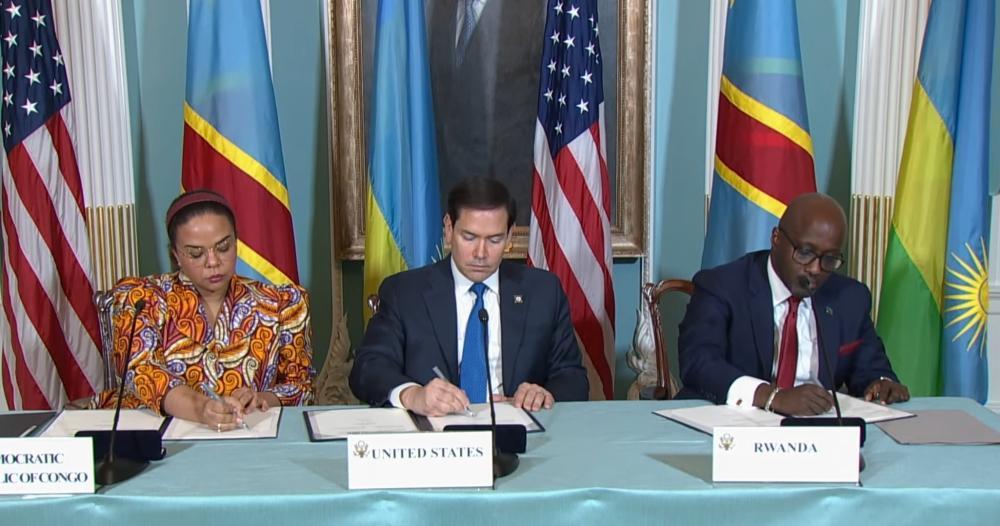Africa-Press – Rwanda. The United States’ involvement in the ongoing efforts to bring peace to eastern DR Congo has attracted attention in recent days. Last week, the foreign ministers of DR Congo and Rwanda met in the U.S., where they signed a “Declaration of Principles” in the presence of U.S. Secretary of State Marco Rubio.
The document focuses on restoring peace, stability, and fostering integrated economic development in eastern DR Congo. It also aims to re-establish normal bilateral relations between the two neighbouring countries.
Though much of the content in the declaration echoes previous peace efforts, some experts believe that U.S. involvement could inject new momentum into efforts to resolve the long-standing crisis.
However, others express disappointment that African nations continue to rely on external actors rather than finding African solutions to African problems.
Alex Mvuka, a researcher and analyst specialising in the Great Lakes Region, told The New Times that U.S. engagement comes after failure of African initiatives, as he pointed out the significance of regional efforts since the neighbouring countries understand the problem better.
“The Luanda peace process has failed; the Nairobi peace process has failed,” he said, as he pointed out that the parties at conflict have not been able to settle their disagreements.
Talking about the USA’s involvement, he said it is a major change since the USA is coming in as a mediator not a military power, as opposed to various countries that intervened before.
“I am seeing this as very important in the sense that Congo has exhausted all means in terms of military intervention and has been trying to involve the USA to intervene militarily,” he noted.
However, he decried that the new development is a shift from the vision of “African solutions for African problems,” as he insisted that DR Congo problems are domestic and should be resolved by regional parties because they understand them better.
For him, the US’ involvement calls to memory a number of previous foreign initiatives that failed to do much in the DR Congo crisis. He gave an example of the UN which has been in the DR Congo for the past 20 years, using $1.5 billion per year as a budget, yet the problem became more complicated.
“When MONUSCO arrived in DR Congo, there were less than 10 armed groups. And today, there are more than 250 armed groups,” he noted.
Gustave Tombola, a researcher with interest in eastern DR Congo, says it is important for everyone who can contribute to the peace to come on board in order to end the crisis.
Pointing out that Qatar was trying to bring together the AFC/M23 and the DR Congo government to iron out their differences, while the USA came in to bring Rwanda and DR Congo on the discussion table, he said both efforts are in line with the African Union (AU) processes.
Political analyst Jean Baptiste Gasominari is also positive about the USA’s involvement, noting that the declaration of principles signed last week in the USA is a step forward.
“I think it’s a very positive step towards dialogue and probably arriving at a peace agreement,” he noted.
He also said that he hopes that the Republican Party’s foreign policy under Donald Trump will play a good role in the process.
“The Republicans are open to discussion, and they do not mingle in the internal affairs of other countries. So this is basically the difference. So it’s not only for the Trump administration, but it’s the approach of the Republicans,” he noted.
Can all peace processes be consolidated?
Asked what he thinks on the various peace processes, Mvuka said their consolidation is crucial, especially in regards to the involvement of regional actors.
“The only way that these solutions can be sustainable is involving regional actors, because Rwanda has insisted within the principles of agreement. By the way, those are principles of creating a situation where the peace process can start,” he said.
“The way to address the root cause of conflict is by consolidating, by bringing all actors together, especially regional actors, so that they can own the solutions that will be decided. They can own the peace agreement that will be decided. Otherwise, there isn’t really a future that guarantees that the peace agreement will be successful,” he added.
For More News And Analysis About Rwanda Follow Africa-Press






